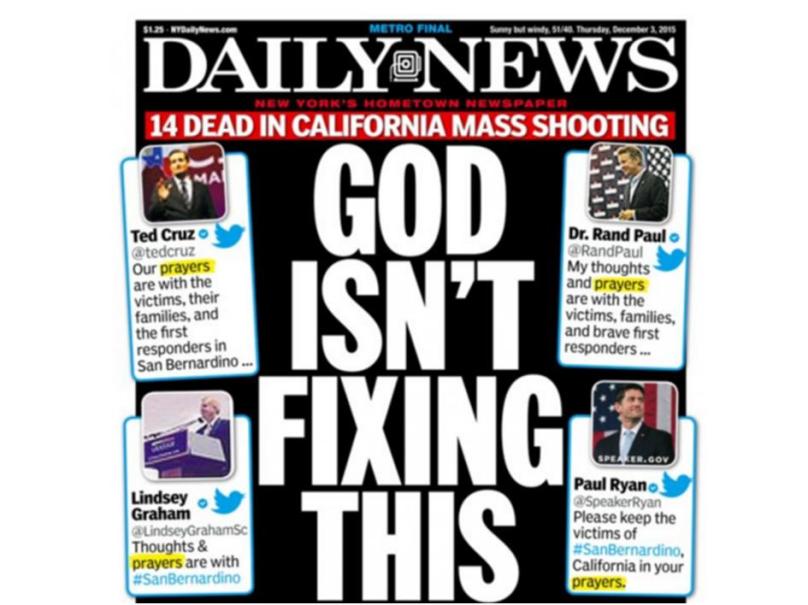
Last week, the US newspaper New York Daily News ran a provocative cover page, featuring the headline – GOD ISN’T FIXING THIS – in large, bold font.
The cover and the accompanying story were both in reference to tweets from various Republican politicians which expressed their prayers for the victims and others affected by the horrific shootings in San Bernardino, California, which left 14 people dead, many others injured and a nation (once again) terrorised.
But this was not a slight on God in the same fashion as we have come to expect from most liberal media outlets. In this instance, He was just collateral damage.
The agenda was not secularist but political, criticising those lawmakers or would-be lawmakers who express their prayers for victims of violent gun crime while being unwilling to support laws which would make guns less accessible.
Yes, there was an agenda behind it, with only the prayers of Republicans being highlighted and then slammed. It was also a simplistic view of the problem, because these particular perpetrators seemed to have the capability to obtain or produce illegal weapons in the absence of legal ones being available.
But there can be no question that the greater the availability of legal guns, the more likely they will be used by people to kill, injure or threaten others. So I think that those who publicly profess to be pro-life and even seek to build a political career on such an identity should be challenged on whether their advocacy for life is consistent and holistic. They should be reminded that while God is indeed omnipotent and could intervene in a dramatic way, He most often invites human persons to participate in His saving power by adding our good works to our prayers.
In this case, it would be an invitation to lawmakers to pray and also to use the great power of governance entrusted to them to do what they can to end gun violence.
Because to whom much is given, much is expected (Luke 12:48.)
The way the New York Daily News presented its challenge was crass, but the point was otherwise well made.
As interesting (or at least dramatic) as US politics is, the gun debate is largely and thankfully irrelevant to us in Australia.
But even so, I think the challenge to ensure that our prayers – all of them, not just those expressed publicly via social media or otherwise – are consistent and holistic applies to all of us.
And I think it’s especially important during this, the Extraordinary Jubilee Year of Mercy.
Jubilee Years usually occur once in a generation, so we are supposed to approach them differently to other years. They are the Easter season in the otherwise Ordinary Time of our lives. If we enter fully into the celebration of this Jubilee Year, “mercy” will be our watchword.
We will be hearing about it, reading about it and speaking about it – proclaiming the mercy of God at every opportunity. Importantly, we will be receiving and experiencing the mercy of God ourselves. We will make pilgrimages to the Holy Door in our own city and maybe in other cities, too.
We will welcome “missionaries of mercy”, priests sent to us specifically as a visible sign of the Good Shepherd seeking out His lost sheep. Mercy is always abounding, but this year, it will be front and centre of everything we do. This is both a gift and a task. Because with all of this public talk of mercy, we need to ensure that our mercy is consistent and holistic. And to whom much is given, much is expected.
This means that the Jubilee Year of Mercy is more than speaking about mercy or even receiving it ourselves. It’s about being mercy. It’s about taking mercy to the peripheries. It’s about accepting the invitation from an all-merciful God to partner with Him in doing whatever we can to extend His mercy to the world.
I know it is a completely obvious point that I am making, but I think it is worthy of a reminder regardless.
It’s not a warning against or an accusation of bad will or hypocrisy, but because we so readily associate mercy with the Sacrament of Reconciliation, we can consider it to be something very personal and very private. It is, but it is not only that. Mercy is also something we need to do and be in public.
Or we can consider the dispensing of mercy to sit firmly in the domain of our priests. It does, but it does not only sit there. Mercy is the responsibility of every Christian who ourselves have received mercy.
As we begin this new and grace-filled year, let us resolve to be merciful in our words and in our actions.
Because to whom much is given, much is expected.
